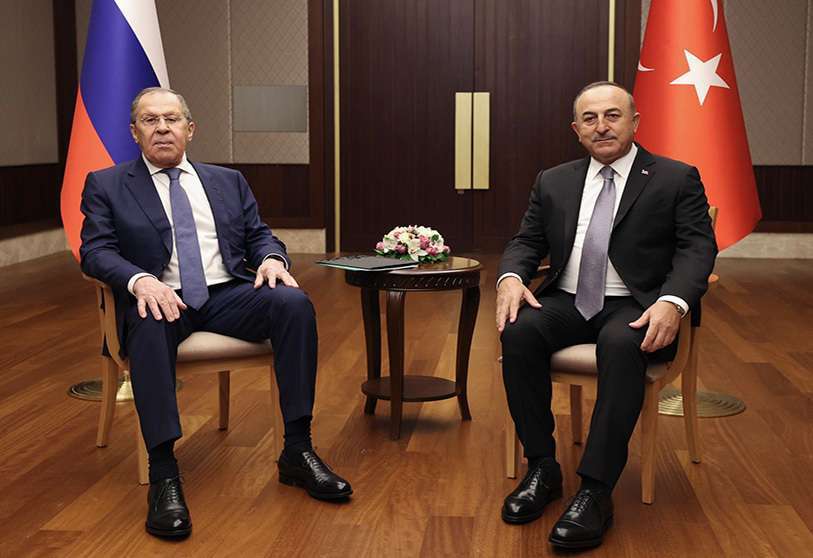Russia and Turkey back grain export plan in the face of Ukraine's misgivings

Russia and Turkey on Wednesday staged a show of approval for the establishment of a safe corridor in the Black Sea to allow the resumption of Ukrainian grain exports. The proposal, put forward by the UN with the aim of ending the food supply crisis, was considered "reasonable" by Turkish Foreign Minister Mevlüt Çavuşoğlu, who is discussing with his Russian counterpart the setting of a series of conditions for implementing the plan.
The head of Turkish diplomacy received the veteran Russian Foreign Minister Sergey Lavrov in Ankara to study ways of unblocking the Ukrainian ports that have been stranded since the end of February as a result of Russia's invasion. The fear of the outbreak of new humanitarian crises at the global level has brought the agendas of Moscow and Ankara, which are negotiating a joint plan at the behest of the United Nations, closer together.
Before the invasion, Ukraine was the world's fifth largest exporter of wheat, corn and sunflower oil, with 90% of global trade concentrated in its ports. Putin's aggression crippled much of its exports. Security threats and, above all, fears of an amphibious attack across the Black Sea forced Ukrainian forces to mine the ports, thus preventing trade activities.
The critical situation on the African continent, which is the main conflict-affected continent, has prompted the UN to seek solutions. The UN called on the parties, Russia and Ukraine, to unblock the situation with the participation of Turkey, a leading NATO member with authority over Black Sea maritime traffic through the Bosphorus Strait. The UN put on the table the establishment of a safe corridor for the shipment of some 22 million tonnes of grain stored in silos in Ukraine.

The plan would involve Turkey escorting Ukrainian vessels exporting wheat with a guarantee that Russia would not attack in exchange, in principle, for a number of conditions. This is the proposal being negotiated between Ankara and Moscow, but so far without conclusive results, pending the intervention of a Ukrainian delegation in the talks in the coming hours. It is therefore the first feasible way out of the supply crisis.
"So far Ukraine has not entered into negotiations, although we don't know if there has been any communication with Kiev," says M'Sur journalist Ilya U. Topper from Istanbul. No direct contacts have been reported with the government of Volodymir Zelensky, which publicly rejected the proposal as "not credible" because of the commitment that Russia would refrain from attacking Ukrainian targets. The EU, for its part, accused Russia of 'militarising' food supplies to gain an advantage in the war.
Turkey's presence in the negotiations would indicate that the safe corridor for grain exports covered by the agreement would be established in the city of Odessa, as well as in the remaining ports still in the hands of the Ukrainian resistance. Ukrainian vessels would be flanked by Turkish naval escorts before heading for international markets without Putin ordering the attack. "These are assurances from the Russian president," Lavrov stressed.
"What Turkey is proposing is to clear the ports and allow Turkish ships to escort Ukrainian vessels," Topper explains. The problem is that demining worries Ukraine, which could see a new amphibious offensive by Russia if Putin decides to violate his commitments again. "Formal guarantees are needed," Topper notes, "but the problem is that nobody believes Russia at this stage. Kiev would have to".
"Turkey is reliable, but we have to see if it has the capacity to guarantee security conditions," Topper notes. The co-author of Democracy is a Streetcar argues that Ankara would not be able to prevent an attack, because Erdoğan "does not have a position of power to negotiate" with Russian President Vladimir Putin. Moreover, the conflict has dealt Turkey 'a heavy economic blow' and needs to be resolved at all costs.
Among the Kremlin's requests, according to Lavrov's statements, is the demining of Black Sea ports, but Moscow's priority is to ease sanctions imposed by Western allies. Çavuşoğlu expressed Turkey's support for easing Western economic restrictions. Although food exports are technically exempt, Russia claims that sanctions on its ships and banks make it impossible to deliver grain to world markets.

The head of Russian diplomacy also said that grain shipments will resume in the coming days from the Ukrainian port of Berdiansk, which is occupied by Russian forces after demining work in the area was completed. His Turkish counterpart, however, was more cautious, and qualified that it would be necessary for the parties to first negotiate with Ukraine over the safety of the ships transporting the exports.
The meeting between Çavuşoğlu and Lavrov coincided with Turkey's campaign in Syria and a decisive moment for NATO, a 'brain-dead' alliance that Putin's actions have not only united but also strengthened. The candidacies of two "neutral" states to date, Sweden and Finland, have only met with Turkey's refusal, a refusal that prevents its definitive entry into the organisation due to its policy of consensus.
Turkey's trump card within NATO could serve on the Syrian chessboard, or even as a catalyst for the food export agreement or as a bargaining chip for a broader strategy containing a hypothetical ceasefire. "Turkey is not using the NATO issue as a bargaining chip, at least publicly," argues Topper. "President Erdoğan is using his veto option within the Atlantic Alliance to force a change in European security policy, nothing more".
Ankara has used its good relations with Kiev and Moscow to act as a moderating actor since the beginning of the invasion. It condemned Russia's invasion but did not join the sanctions. Meanwhile, Turkish diplomacy managed to bring the parties at the negotiating table in Istanbul at the end of March, but ceasefire talks broke down after the discovery of the Bucha massacre. Turkey has been keen to take control of the Black Sea ever since and, with this agreement, hopes to do so.









